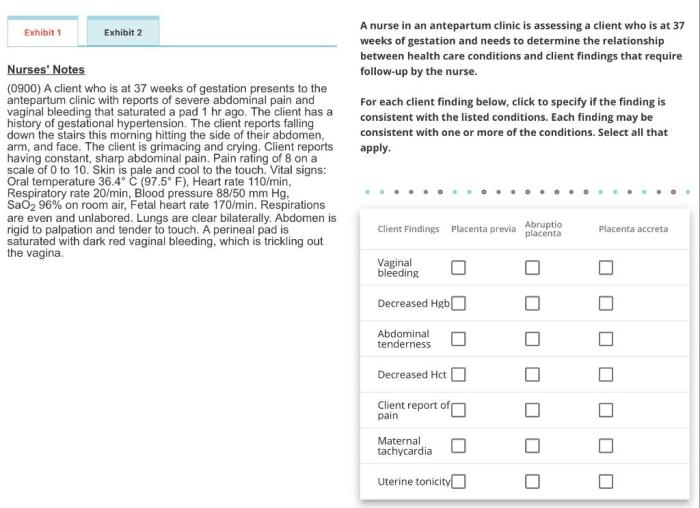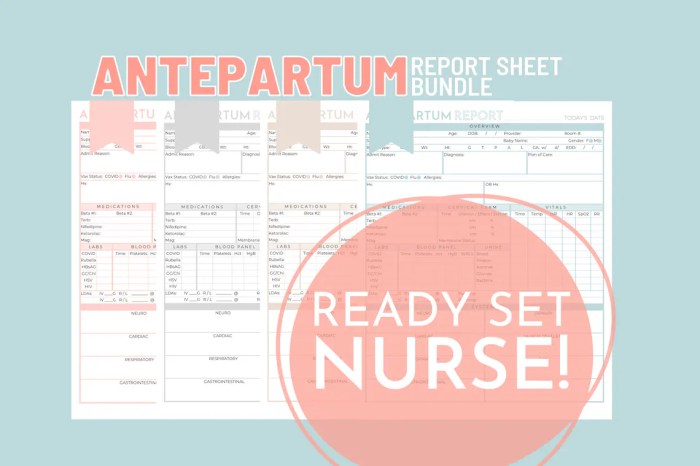A nurse in an antepartum clinic plays a crucial role in the healthcare journey of pregnant women, providing comprehensive care and support throughout their pregnancy. These dedicated nurses are at the forefront of ensuring the well-being of both the mother and the developing baby, offering a range of essential services that contribute to a healthy and positive pregnancy experience.
Antepartum nurses are highly skilled professionals who possess a deep understanding of the physiological and emotional changes that occur during pregnancy. They are responsible for monitoring the health of the mother and fetus, providing education and counseling, and collaborating with other healthcare providers to ensure a seamless and coordinated care plan.
Roles and Responsibilities of a Nurse in an Antepartum Clinic

Nurses play a crucial role in providing comprehensive care to pregnant women during the antepartum period, which encompasses the time from conception to the onset of labor. Their primary duties and tasks revolve around ensuring the well-being of both the mother and the developing fetus.
The responsibilities of a nurse in an antepartum clinic are multifaceted, including:
Prenatal Care
- Conducting comprehensive prenatal assessments, including physical examinations, medical history reviews, and risk factor screenings.
- Providing education and counseling on prenatal nutrition, exercise, and lifestyle modifications.
- Monitoring fetal growth and development through regular ultrasounds and other diagnostic tests.
Patient Education
- Educating pregnant women on various aspects of pregnancy, childbirth, and postpartum care.
- Providing guidance on prenatal vitamins, vaccinations, and other essential health practices.
- Empowering women to make informed decisions about their pregnancy and birth plan.
Emotional Support
- Offering emotional support and counseling to pregnant women and their families.
- Addressing concerns, fears, and anxieties related to pregnancy and childbirth.
- Providing a safe and confidential space for women to discuss their experiences.
Collaboration and Communication
- Collaborating with other healthcare professionals, such as obstetricians, midwives, and dietitians, to ensure continuity of care.
- Communicating effectively with patients, families, and other healthcare providers.
- Documenting patient information accurately and maintaining confidential medical records.
Patient Care and Monitoring

In an antepartum clinic, nurses play a crucial role in ensuring the well-being of pregnant women and their developing babies. They conduct comprehensive assessments and monitoring procedures to identify and address any potential risks or complications.
Assessment and Monitoring Procedures
Nurses perform various assessments to evaluate the health status of pregnant women. These include:
- Vital sign monitoring (blood pressure, pulse, temperature, respiration)
- Physical examinations (abdominal palpation, fetal heart rate auscultation)
- Weight measurement and fundal height assessment
- Laboratory tests (blood work, urine analysis)
These assessments help nurses detect abnormalities, such as gestational hypertension, anemia, or preterm labor, and initiate appropriate interventions.
Prenatal Tests and Screenings
Nurses assist in conducting prenatal tests and screenings to assess the health of the fetus and identify any potential risks. These include:
- Ultrasound scans (to determine fetal growth, position, and anatomy)
- Non-stress tests (to evaluate fetal well-being)
- Amniocentesis (to test for genetic disorders)
- Chorionic villus sampling (to test for genetic disorders)
The results of these tests and screenings guide clinical decision-making and help ensure the best possible outcomes for both the mother and the baby.
Management of High-Risk Pregnancies
Nurses play a vital role in managing high-risk pregnancies, which involve potential complications that require specialized care. They:
- Monitor the mother and fetus closely for signs of distress
- Provide education and support to the mother
- Coordinate with other healthcare professionals, such as obstetricians and pediatricians
- Implement interventions to mitigate risks and ensure a healthy pregnancy
Nurses’ expertise and collaboration with other healthcare providers ensure that women with high-risk pregnancies receive the specialized care they need.
A nurse in an antepartum clinic, supporting expectant mothers, may not initially seem connected to the state board of cosmetology. However, for those seeking licensure in the field of cosmetology in North Dakota, the state board of cosmetology nd regulates the industry.
Returning to our nurse in the antepartum clinic, she may encounter clients who are pursuing careers in cosmetology and can provide guidance on the necessary steps to obtain a license.
Education and Counseling

Antepartum nurses provide comprehensive education and counseling to pregnant women and their families. They equip them with the knowledge and skills necessary for a healthy pregnancy, labor, and delivery.
Nutritional Guidance
Nurses emphasize the importance of a balanced diet during pregnancy. They provide information on food groups, recommended daily intake, and foods to avoid. They also discuss the benefits of prenatal vitamins and supplements.
Exercise and Fitness
Nurses encourage regular exercise to promote physical and mental well-being. They provide guidelines on safe and effective exercises, including walking, swimming, and yoga. They also discuss the importance of avoiding strenuous activities or contact sports.
Labor Preparation
Nurses help women understand the stages of labor and delivery. They provide information on pain management techniques, breathing exercises, and positions that can facilitate childbirth. They also discuss the role of the support person during labor.
Effective Patient Education Strategies
- Use clear and concise language.
- Tailor information to the individual’s needs and understanding.
- Involve the support person in the education process.
- Provide written materials for reinforcement.
- Encourage active participation and ask questions to assess comprehension.
Collaboration and Coordination

In the dynamic environment of an antepartum clinic, collaboration and coordination among healthcare professionals are essential for delivering comprehensive patient care. The nurse plays a pivotal role in facilitating effective communication and coordinating care within the interdisciplinary team.
Communication is the cornerstone of successful collaboration. Nurses serve as the primary contact between patients, physicians, midwives, and other healthcare providers. They gather and relay patient information, ensuring that all members of the team have a comprehensive understanding of the patient’s condition and care plan.
This continuous exchange of information enables the team to make informed decisions, adjust treatment strategies as needed, and provide seamless patient care.
Interdisciplinary Collaboration
Interdisciplinary collaboration is crucial in managing the complex needs of antepartum patients. Nurses work closely with physicians and midwives to develop and implement care plans that address both the medical and psychosocial aspects of pregnancy. They consult with nutritionists to ensure optimal maternal nutrition, collaborate with social workers to provide support for families facing challenges, and coordinate with physical therapists to address any musculoskeletal issues that may arise during pregnancy.
- Patient Assessment:Nurses conduct thorough patient assessments, gathering vital signs, monitoring fetal heart rate, and assessing for any signs of complications.
- Care Plan Development:Nurses participate in the development of individualized care plans that Artikel specific interventions, medications, and follow-up appointments.
- Patient Education:Nurses provide education and counseling to patients on topics such as nutrition, exercise, fetal development, and labor preparation.
- Monitoring and Evaluation:Nurses monitor patients’ progress, assess their response to interventions, and make adjustments to the care plan as needed.
- Collaboration with Other Professionals:Nurses collaborate with physicians, midwives, nutritionists, social workers, and physical therapists to provide comprehensive patient care.
By fostering effective collaboration and coordination, nurses ensure that antepartum patients receive the highest quality of care, promoting optimal outcomes for both mother and baby.
Ethical Considerations: A Nurse In An Antepartum Clinic

Ethical considerations are an integral part of antepartum nursing, guiding nurses in providing compassionate and respectful care while navigating complex medical and personal situations.
Nurses face ethical dilemmas related to informed consent, patient autonomy, and end-of-life care, among others. It’s crucial for nurses to understand and adhere to ethical principles to ensure the well-being and dignity of their patients.
Informed Consent
Informed consent is a fundamental ethical principle that requires patients to be fully informed about their medical procedures, risks, and benefits before making decisions about their care. Nurses play a vital role in providing clear and comprehensive information to patients, ensuring they understand the implications of their choices and make informed decisions.
Patient Autonomy
Patient autonomy is the right of patients to make decisions about their own care, even if those decisions differ from the recommendations of healthcare professionals. Nurses must respect patients’ autonomy and support their decisions, while also providing guidance and education to help them make informed choices.
End-of-Life Care
End-of-life care involves ethical considerations related to pain management, palliative care, and end-of-life decisions. Nurses provide compassionate and holistic care, respecting patients’ wishes and supporting their families during this challenging time.
Ethical Decision-Making, A nurse in an antepartum clinic
Nurses can navigate ethical dilemmas by adhering to the following guidelines:
- Identify the ethical issues involved.
- Gather information and consult with colleagues.
- Consider the patient’s values and preferences.
- Weigh the potential benefits and risks of different options.
- Make a decision that aligns with ethical principles and the best interests of the patient.
General Inquiries
What are the primary responsibilities of an antepartum nurse?
Antepartum nurses are responsible for monitoring the health of the mother and fetus, providing education and counseling, and collaborating with other healthcare providers to ensure a seamless and coordinated care plan.
What are some common prenatal tests and screenings conducted by antepartum nurses?
Common prenatal tests and screenings conducted by antepartum nurses include blood tests, urine tests, ultrasounds, and genetic testing.
How do antepartum nurses support women with high-risk pregnancies?
Antepartum nurses provide specialized care and monitoring for women with high-risk pregnancies, working closely with other healthcare professionals to manage potential complications and ensure the well-being of both the mother and the baby.
What ethical considerations do antepartum nurses face?
Antepartum nurses face ethical considerations related to informed consent, patient autonomy, and end-of-life care, adhering to guidelines and principles to ensure ethical decision-making.
